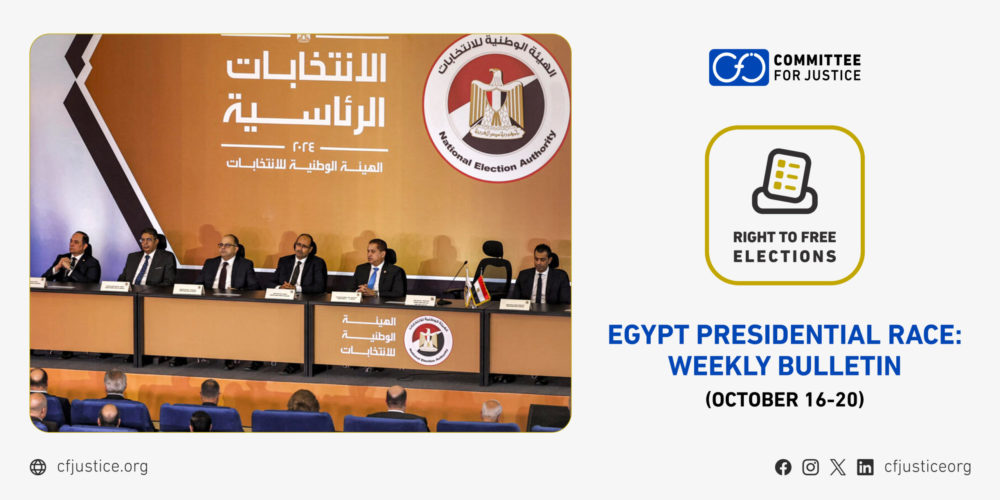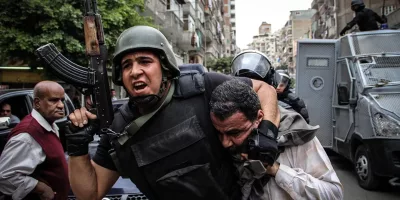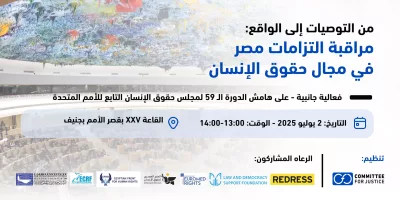As part of the presidential election observation project, The Right To Free Elections, initiated by the Committee for Justice (CFJ) during the first phase of the presidential election, the organization continued its efforts in the first week of the second phase, from October 16 to 20, 2023. During this period, CFJ focused on monitoring statements, press reports, and verifying any violations of individuals’ and political opposition parties’ rights. This project aligns with CFJ’s overarching mission, which revolves around monitoring and documentation methodologies in the realms of human rights and politics. It is also a testament to our commitment to promoting transparency and accountability, thereby empowering citizens to exercise their civil and political rights.
I. Violations during the documentation period
During the second phase of the 2024 Egyptian election, the National Electoral Commission, under the leadership of Chancellor Hazem Badawi, who serves as the President of the Court of Cassation, released the initial list of presidential candidates through Resolution No. 24 on October 16, 2023. This list included the incumbent President, Abdel Fattah El-Sisi, the presidential candidate from the Egyptian Democratic Party, Farid Zahran, the candidate from the Wafd Party, Abdul Sened Yamama, and the presidential candidate Hazem Omar.
In the first phase of the elections campaign, which involved the collection of official endorsements and meeting the candidacy requirements, the CFJ documented numerous violations. These violations encompassed physical abuse of citizens attempting to submit endorsements for the former opposition candidate, Ahmed El Tantawi, who is now out of the race. CFJ also observed the collusion of Land Registry officials, security authorities, individuals with malicious intent, and members of The Future of a Homeland party, all of whom hindered and prevented the delivery of endorsements for the opposition candidate while facilitating the process of collecting endorsements for President Sisi.
Despite numerous complaints sent by opposition forces to the National Electoral Commission regarding the failure to register endorsements for opposition candidates, the Commission has consistently rejected these complaints and denied any wrongdoing by the official authorities of the State. In its initial statement dated September 29, 2023, the Committee affirmed that it has taken “all necessary actions and decisions” in strict accordance with the provisions of the Constitution, laws, and international standards. It emphasized that the implementation process is carried out in an organized and consistent manner under the Commission’s guidance. Furthermore, the Commission explicitly directed the Land Registry offices, responsible for issuing endorsements, to extend their working hours to facilitate citizens’ access to filing their endorsements.
The Commission’s statement also included a strong condemnation of what it deemed “attempts to cast doubt and engage in unacceptable criticism of its work.” It asserted that, based on its ongoing monitoring, there have been no irregularities, acts of favoritism, or harassment of any individual, and it referred to certain claims in this regard as “false allegations.”
As obstacles to the registration of endorsements continued to mount, the opposition candidate, El-Tantawi, submitted an application to the Board of Directors of the National Commission to permit the collection of “popular powers of attorney” or “endorsement forms” in order to establish his eligibility to run for the presidential election. However, in its statement dated October 10, the Commission viewed this request as an attempt to seek “special treatment.” It deemed the request unjustified and reiterated its commitment to treating all candidates equally in the implementation of decisions and rules governing the electoral process.
During the first phase of the presidential campaign, supporters of Sisi were able to register an impressive one million and one hundred thousand endorsements. Additionally, heads of opposition parties met the candidacy requirements with parliamentary recommendations. The hindrance of popular support for the opposition candidate constitutes a clear discrimination against candidates who do not hold parliamentary seats and, consequently, cannot meet the conditions required for candidacy. Similarly, arbitrary practices in the issuance of endorsements to supporters of potential candidate Gamila Ismail led to her decision to withdraw from the presidential race in response to her party’s decision, the Constitution, to withdraw. She cited the indiscriminate behavior of Land Registry employees, including releasing endorsements to other candidates, failing to stamp the Republic’s logo on documents, or refusing to hand over endorsements after issuance, as clear violations of citizens’ rights.
The security authorities did not limit their actions to the aforementioned measures. They went further by conducting investigations into the individuals collecting “endorsement forms” on behalf of the potential candidate Tantawi, accusing them of falsifying the endorsements. This move insinuated that the formal issuance of these documents was possible and that members of the Tantawi campaign had clandestinely engaged in forging and distributing these powers with the intent to deceive both citizens and authorities.
In the first week of the second phase, which commenced with the official announcement of the list of candidates, the Committee for Justice observed a wave of arrests carried out by security authorities, targeting numerous members of the campaign supporting the potential candidate Tantawi. These arrests were made in connection with case 2255/2023, and the charges included spreading false news and allegedly affiliating with a “terrorist group.” Among those detained were Professor Ali Mohamed Al-Shatouri and several women activists actively involved in the election campaign. These actions undoubtedly represent a significant infringement on citizens’ rights to engage in political participation within a climate of reassurance and openness. The political authorities are utilizing the security apparatus to suppress opponents who endorse a potential “youthful” candidate, underscoring the systematic violations committed by the authorities throughout the electoral process.
These arbitrary arrests occurred simultaneously with the authorities’ claims that political opponents had “counterfeit endorsement forms.” This coincided with security forces deploying individuals to intimidate opponents, fabricate clashes in front of Land Registry offices, and engage in physical altercations. These actions, as previously detailed in the initial report, indicate the authorities’ intent to “pursue” political opponents and not merely temporarily curtail their rights to political participation.
II. Comment on causes and consequences
The violations that have been consistently monitored and verified during this week clearly indicate the political regime’s reluctance to conduct free and fair elections. These actions contradict President Sisi’s previous statements about providing citizens with an opportunity for change. Furthermore, these violations suggest a power grab by the political establishment in its quest to control the electoral landscape, effectively transforming the electoral process into a referendum on extending President Sisi’s rule rather than a genuine election featuring multiple candidates. This approach not only undermines the democratic process but also poses a threat to the stability and peace of Egyptian society.
At a time when the economic crisis has escalated, particularly affecting the lives of poor and middle-class citizens, the political system remains isolated in its new administrative city, detached from the heart of the capital. The consequences of various crises, including the Russian-Ukrainian war, food shortages, inflation, the devaluation of the local currency, the government’s inability to meet urgent debt obligations, import essential food items, and pay employee salaries on time, alongside the impact of the conflict in Gaza, have left the Egyptian populace simmering with anger.
Within this context, the regime’s heavy-handed security apparatus, which manages the election process, only intensifies the pressure on the Egyptian population. They had hoped for a degree of relief and had anticipated a rational if not entirely authentic competition in the presidential elections. However, it has now devolved into yet another theatrical production in which hand-picked opposition figures are preselected to play their roles in an electoral contest with predetermined outcomes.
At the administrative and institutional level, the process of registering endorsements has revealed the shortcomings of the National Electoral Commission in managing the first phase of the elections and its inability to function as an independent institution separate from the ruling authority. The Commission allocated only one third of the Land Registry Offices across the country (217 out of 650 offices) for registering endorsements. In all these offices, employees repeatedly cited various excuses to hinder the registration process, including claims of power outages, information system breakdowns, unregistered IDs, and so on. Additionally, the Commission failed to take action against groups of thugs, government employees, and ‘paid’ supporters of President Sisi who occupied the entrances of Land Registry Offices to obstruct citizens from submitting endorsements for the opposition.
Moreover, CFJ observed that the timeframe allowed for collecting endorsements was limited to just 20 days, from the announcement of the voter registration call on September 25 to October 14. The Commission also failed to respond to the thousands of complaints from citizens regarding the obstacles they faced. The claim of “system breakdown” became a common occurrence across the country rather than an isolated issue in one or two offices. The failure to promptly address these obstacles, extend the registration period for endorsements, and find alternative solutions for citizens to exercise their political participation rights all indicate bias in favor of the incumbent president.
CFJ documented testimonies revealing that notary offices were readily providing endorsements to supporters of the regime without even requiring their signatures. Additionally, the Commission failed to cooperate with civil society organizations that should be monitoring the electoral process. It could have established a few notary offices within its headquarters to register the candidates’ endorsements and dispatched its representatives to monitor the functioning of these agencies following the increased frequency of complaints. These are steps that the National Electoral Commission could have taken to ensure the integrity of the electoral process and protect citizens’ rights.
It is not surprising that the National Electoral Commission has taken this direction, considering that its members were directly appointed by a presidential order (no. 426/2023), specifying five councilors for membership in the Commission as per Article 209 of the Constitution and Article 5 of the Act establishing the National Electoral Commission.
President Sisi is determined to block the path of the young opposition that refuses to accept a ‘silence’ deal with the government. He is aiming to regain public support that has been eroded by economic crises and growing poverty by exploiting hot-button issues to ensure the election proceeds as planned. All of this is taking place within a climate of fear and terror characterized by arbitrary detentions and punishments of opponents and activists involved in election campaigns. These actions are intended to track them down with legal suits and thereby extinguish their chances of continued political engagement. The result is a serious undermining of citizens’ rights to exercise free and safe voting in a transparent manner, and it hinders their ability to express their frustration, anger, and claims to the existing political power, which seeks to maintain its hold on the country at all costs.






